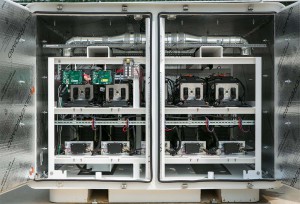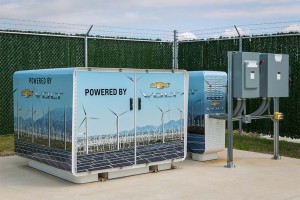
What do you do with the used batteries when a vehicle like the Chevrolet Volt or Nissan Leaf are ready to be scrapped? The traditional answers might have been to dump them in a landfill or break them apart for their raw materials, but Nissan and Chevy have come up with some useful alternatives.
In reality, the lithium-ion batteries used by the auto industry usually have quite a bit of life left, even if they no longer store enough energy to propel a vehicle. So, both Nissan and Chevrolet want to put old batteries back to work as stationary backup power sources.

“Even after the battery has reached the end of its useful life in a Chevrolet Volt, up to 80% of its storage capacity remains,” noted Pablo Valencia, senior manager of battery lifecycle management for General Motors. “This secondary use application extends its life, while delivering waste reduction and economic benefits on an industrial scale.”
GM today announced it has packaged five old Volt batteries together to serve as a backup power source for the company’s new IT center at its Milford, Michigan proving grounds. The backup system is connected to a network of renewable power generators, including a 74-kilowatt solar array and two 2 kilowatt wind generators.

Together, they can produce enough power for the IT center and its exterior lighting – during the day and when wind is blowing, anyway. The backup battery system can help keep the lights on at night or when the air is calm. And when it is fully charged, excess energy is sent back to the grid.
According to GM, the Milford system is a prototype “living lab to understand how the battery redistributes energy at this scale.”
“This system is ideal for commercial use because a business can derive full functionality from an existing battery while reducing upfront costs through this reuse,” Valencia said.
GM has been working with several partners, including Duke Energy and ABB, to study commercial applications that could see old Volt batteries repurposed commercially, though it is not yet ready to announce specific plans, apparently.
(GM to announce new uses for old batteries. For more, Click Here.)
Nissan is, however. Working with Sumitomo Corp. and Green Charge Networks in the 4E joint venture, the goal is to reuse old Leaf batteries in a backup power supply system. As with GM, the first application will be at a corporate facility, a Nissan building in California. But the partners hope to offer a similar system commercially starting later this year.
The goal is to have both business and consumer customers link the system up to wind and solar generators to serve as both a load-leveling device and for energy backup.
“A lithium-ion battery from a Nissan Leaf still holds a great deal of value as energy storage, even after it is removed from the vehicle, so Nissan expects to be able to reuse a majority of Leaf battery packs in non-automotive applications,” said Brad Smith, director of Nissan’s 4R Energy business in the U.S.
(Click Here for details about GM’s return to the medium-duty truck market.)
Nissan did not release final specifications, including the amount of power each pack would hold or the pricing.
GM and Nissan join Mercedes-Benz and Tesla in putting their battery technology to work in stationary applications. In the case of Tesla Motors, however, the California-based company’s new Tesla Energy division is using brand-new batteries in the PowerWall backup system it recently announced.
Set to go on sale later this year, Tesla initially said it would charge $3,500 for a 10-kilowatt backup system. It has since announced it will roughly double the amount of storage without raising the price. That should make the technology more competitive with backup generator systems.
(To see how Panasonic will help Tesla launch its new gigafactory, Click Here.)
Unlike the GM and Nissan system, each PowerWall will use new batteries which, starting next year, will be supplied by Tesla’s new Gigafactory plant currently being erected in Reno, Nevada with help from technology partner Panasonic.








It all sounds great until you look at the actual cost and complications. To adapt these used EV batteries for grid power back-up requires some significant investment which is tough to justify when Diesel generator back-up is far less expensive and much more flexible.
BTW, the EV batteries are suppose to last 10-12 years so there should not be many expired batteries floating around just yet unless they are defective batteries which may not even be viable for repurposing. In the end these Li-ion batteries still present a major recycling concern due to their toxic materials and borderline secondary uses.
Let’s also not forget that a used Li-ion battery has a higher fire risk than new Li-ion batteries. Just basic handling of these batteries can cause a short circuit and fire. In the end society still has to deal with a significant toxic chemical issue. The tree huggers seem to have conveniently forgotten this aspect of EVs.
On the atomic metal scale lithium is the lightest metal. As for blowing up talk to mechanics that have a lead acid battery blow up from over charging. Hydrogen gas is created. Yet not is mention of the eight to ten thousand cars that hurn on the side of the road every yearthat the fire dept puts out. I’ll take my chances with lithium. I remember talking to a factory engineer doing a investigation of a rental car fire. He said that there is so little left to figure out where it started, but the Ford was paying the insurance companies for when their ignition switches were starting fires in peoples garages, and the insurance caught on before the government.
actually to power a house for 3 days you only need about 5 kilowatts and with a nissan leaf 24 kilowatt battery at say even 50% that leaves with 12 kilowatts more than enough for 5 to 6 days. Since I own a leaf I plan on keeping the battery pack and buying a new improved battery and keeping the leaf. My house is solar powered.
When was the last time you saw a lead-acid battery catch on fire: Answer NEVER because they don’t. Yes they can explode if they are over-charged by someone who doesn’t know what they are doing or if a spark is created next to a battery that has been rapidly charged, (as can Li-ion batteries). Considering the hundreds of millions of batteries in use daily and the less than.0000001% of battery explosions per year due to improper handling of lead-acid batteries, your conclusions are in complete error but typical of the misinformed.
Research how many Li-ion batteries in computers have caught fire… or how many EVs have caught fire or how many homes have burned from Li-ion batteries that caught fire. Being in denial doesn’t change reality, it just makes you more vulnerable to suffer the consequences. It’s very easy to dupe the public and the charlatans are cashing in by doing so.
GM and Nissan’s goal is to down play the toxic waste issue by dumping expired batteries on someone else to ultimately deal with. When you do the math it’s pretty easy to see that these depleted batteries are not a good choice for home stand-by power and they won’t provide a meaningful service life. This will all be exposed shortly and then the tree huggers will get another reality check.
Anyone who has DTE as their utility company needs battery backup.
LOL…agree, GT. I installed an auto backup system when I replaced my home HVAC five years ago and it went into operation at least 11 times in the first six months. It has since been needed on several occasions for anywhere from one to four days straight due to DTE failures.
Paul E.